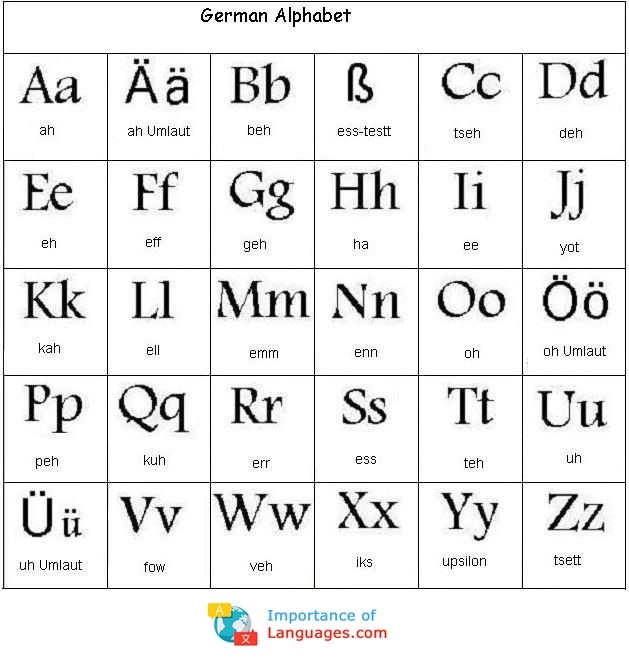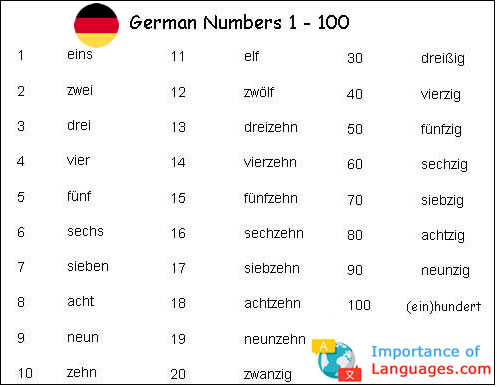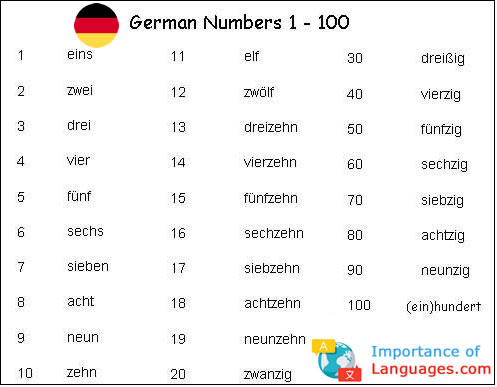English-German Glossary of Animal Terms (A-E).Learn more about animals and their noises in our Tierlexikon.
| Animals • Tiere (A-E) Annotated English-German Glossary | ||
| Animal | Tier | Plural/Sound |
| A | ||
| aardvark | das Erdferkel | Erdferkel |
| ant | die Ameise | Ameisen |
| IDIOM: Er hat Hummeln im Hintern. = He's got ants ('bumblebees') in his pants. | ||
| anteater | der Ameisenbär | Ameisenbären |
| antelope | die Antilope | Antilopen |
| ape | der Affe (monkey) der Menschenaffe (ape) den/dem/des Affen | Affen schreien, kreischen oder brüllen. |
| B | ||
| baboon | der Pavian | Paviane kreischen. |
| bat | die Fledermaus | Fledermäuse kreischen oder quietschen. |
| bear | der Bär den/dem/des Bären | Bären brummen oder brüllen. |
| bee | die Biene | summ summ brumm brumm Bienen summen. |
| beetle | der Käfer | Käfer |
| bird | der Vogel | piep piep tswit tswit Vögel singen, piepsen, zwitschern, usw. |
| Singvögel: SONGBIRDS - Various kinds. | ||
| boar | der Eber | grunz |
| bobcat | der Luchs/Silberlöwe | Luchse |
| Luchs: The bobcat/lynx family includes the Pardel-Luchs, Polar-Luchs, Rot-Luchs, and the Wüsten-Luchs. | ||
| buffalo | der Büffel | Büffel |
| bull | der Stier | Stiere schnauben. |
| bumblebee | die Hummel | Hummeln summen. |
| IDIOM: Er hat Hummeln im Hintern. = He's got ants in his pants. | ||
| butterfly | der Schmetterling | Schmetterlinge |
| C | ||
| camel | das Kamel | Kamele |
| cat | die Katze | miau Katzen miauen, fauchen und schnurren. |
| caterpiller | die Raupe | Raupen |
| centipede | der Hundertfüßer | - |
| cheetah | der Gepard | Geparde |
| chick | das Küken | piep piep |
| chicken | das Huhn | gak gak dok dok Hühner gackern. |
| chimpanzee | der Schimpanse | Schimpansen schreien und kreischen. |
| chipmunk | das Backenhörnchen das Chipmunk | Backenhörnchen knattern. |
| cougar | der Puma/Silberlöwe | Pumas/Silberlöwen |
| cow | die Kuh | muh Kühe muhen. |
| coyote | der Kojote den/dem/des Kojoten | Kojoten jaulen |
| crab | der Krebs/Taschenkrebs | Krebse |
| crane | der Kranich | Kraniche |
| crayfish | der Krebs | Krebse |
| cricket | die Grille | Grillen zirpen. |
| crocodile | das Krokodil | Krokodile |
| crow | die Krähe | kwrah kwrah Krähen krächzen. |
| cuckoo | der Kuckuck | Kuckucke/kuckuck |
| D | ||
| deer | das Reh | Rehe |
| dinosaur | der Dinosaurier | Dinosaurier |
| dog | der Hund | wau wau wuff wuff Hunde bellen, blaffen, kläffen, knurren und jaulen. |
| dolphin | der Delphin | Delphine |
| NOTE: Don't confuse the dolphin fish (percoid) with the mammalian dolphin or porpoises! | ||
| porpoise = der Schweinswal - Schweinswale schnattern und zwitschern. | ||
| donkey | der Esel | Esel/iaah iaah |
| dove, pigeon | die Taube | gurr gurr Tauben gurren. |
| dragonfly | die Libelle | Libellen |
| duck | die Ente | quaak quaak Enten schnattern oder quaken. |
| E | ||
| eagle | der Adler | Adler schreien. |
| eel | der Aal | Aale |
| elephant | der Elefant | Elefanten trompeten. |
| elk, moose | der Elch | Elche |
| F | ||
| falcon | der Falke | Falken schreien. |
| ferret | das Frettchen | - |
| fish | der Fisch | Fische |
| flea | der Floh | Flöhe |
| fly | die Fliege | Fliegen summen. |
| fox | der Fuchs | Füchse |
| frog | der Frosch | quak quak Frösche quaken. |
| G | ||
| gander | der Gänserich | Gänseriche schnattern/schreien. |
| gerbil | die Rennmaus | Rennmäuse |
| giraffe | die Giraffe | Giraffen |
| goat | die Ziege | mäh mäh Ziegen meckern. |
| goose | die Gans | Gänse schnattern/schreien. |
| gorilla | der Gorilla | Gorillas brüllen und schreien. |
| grasshopper | die Heuschrecke der Grashüpfer |
Heuschrecken |
| groundhog | das Murmeltier | Murmeltiere |
| guinea pig | das Meerschweinchen | - |
| gull, seagull | die Möwe | Möwen |
| H | ||
| hamster | der Hamster | Hamster |
| hare | der Hase | Hasen |
| hawk | der Habicht | Habichte kreischen oder schreien. |
| hedgehog | der Igel | Igel |
| hen | die Henne | gack gack Hennen gackern. |
| hippopotamus | das Nilpferd | Nilpferde |
| honeybee, bee | die Honigbiene, Biene | Bienen summen. |
| hornet | die Hornisse | Hornissen summen. |
| horse | das Pferd | huii Pferde wiehern. |
| Giddyup! = Hüh! - Whoa! = Brr! | ||
| hummingbird | der Kolibri | Kolibris |
| I | ||
| insect | das Insekt | Insekten |
| J | ||
| jackal | der Schakal | Schakale |
| jaguar | der Jaguar | Jaguare |
| K | ||
| kangaroo | das Känguru | Kängurus |
| kitten, kitty | das Kätzchen die Mieze |
Kätzchen/Miezen miauen. |
| kiwi | der Kiwi | Kiwis |
| koala | der Koala | Koalas |
| L | ||
| ladybug ladybird |
der Marienkäfer | Marienkäfer |
| lamb | das Lamm | wäh wäh Lämmer blöken. |
| leopard | der Leopard | Leoparden brüllen. |
| lion | der Löwe den/dem/des Löwen |
Löwen brüllen. |
| lizard | die Eidechse | Eidechsen |
| lobster | der Hummer | - |
| locust | die Heuschrecke | Heuschrecken |
| lynx | der Luchs | Luchse |
| M | ||
| minnow | die Elritze | Elritzen |
| mole | der Maulwurf | Maulwürfe |
| monkey | der Affe den/dem/des Affen |
Affen schreien. |
| moose, elk | der Elch das Elentier |
Elche |
| mosquito | der Moskito | Moskitos |
| moth | die Motte | Motten |
| mountain lion | der Puma/Silberlöwe | Pumas/Silberlöwen |
| mouse | die Maus | Mäuse piepsen. |
| mule | der Maulesel | iaah |
| N | ||
| newt | der Wassermolch | Wassermolche |
| O | ||
| octopus | der Krake | Kraken |
| opossum | die Beutelratte das Opossum |
Beutelratten |
| orangutang | der Orang-Utang | Orang-Utangs |
| ostrich | der Strauß | Strauße |
| otter | der Otter | Otter |
| owl | die Eule der Uhu |
huh huh Eulen heulen, schreien oder rufen. |
| ox | der Ochs | |
| P | ||
| panda | der Panda/Bambusbär | Pandas |
| panther | der Panther | Panther |
| parrot | der Papagei | Papageien krächzen und pfeifen. |
| pelican | der Pelikan | Pelikane |
| penguin | der Pinguin | Pinguine |
| pheasant | der Fasan | Fasane |
| pig | das Schwein | Schweine grunzen. |
| pigeon | die Taube | gurr gurr Tauben gurren. |
| polar bear | der Eisbär | Eisbären |
| porcupine | das Stachelschwein | -schweine |
| puma | der Puma | Pumas |
| porpoise | der Schweinswal | Schweinswale schnattern und zwitschern. |
| NOTE: Don't confuse the dolphin fish (percoid) with the mammalian dolphin or porpoises! You can understand the German name better if you remember that "porpoise" is based on Latin porca (pig). | ||
| Q | ||
| quail | die Wachtel | Wachteln |
| R | ||
| rabbit | das Kaninchen | Kaninchen |
| racoon | der Waschbär | Waschbären |
| rat | die Ratte | Ratten |
| rattlesnake | die Klapperschlange | Klapperschlangen klappern. |
| raven | der Rabe | kwrah kwrah Raben krächzen. |
| reindeer | das Rentier | Rentiere |
| rhinoceros | das Nashorn | Nashörner |
| rooster | der Hahn | kikeriki Hähne krähen. |
| S | ||
| salamander | der Salamander der Molch |
Salamander Molche |
| salmon | der Lachs | Lachse |
| seahorse | das Seepferdchen | Seepferdchen |
| seagull | die Möwe | Möwen kreischen und schreien. |
| seal | die Robbe der Seehund |
Robben/Seehunde bellen. |
| sea lion | der Seelöwe den/dem/des Seelöwen |
Seelöwen bellen. |
| shark | der Hai der Haifisch |
Haie Haifische |
| sheep | das Schaf | wäh wäh Schafe blöken. |
| snail | die Schnecke | Schnecken |
| snake | die Schlange | sss Schlangen zischen. |
| shrimp | die Garnele die Krevette |
Garnelen Krevetten |
| sow | die Sau | Sauen grunzen. |
| skunk | das Stinktier | -tiere |
| squid | der Tintenfisch | -fische |
| squirrel | das Eichhörnchen | - |
| stallion | der Hengst | Hengste wiehern und schnaubern. |
| stork | der Storch | Störche |
| swan | der Schwan | Schwäne |
| T | ||
| tadpole | die Kaulquappe | Kaulquappen |
| tern | die Seeschwalbe | Seeschwalben zwitschern. |
| tiger | der Tiger | Tiger brüllen. |
| toad | die Kröte | Kröten |
| tortoise giant tortoise |
die Schildkröte Riesenschildkröte |
Schildkröten |
| trout | die Forelle | Forellen |
| turkey | der Truthahn die Truthenne der Puter |
- |
| turtle | die Schildkröte | -kröten |
| V | ||
| vulture | der Geier | Geier kreischen. |
| W | ||
| walrus | das Walross | Walrosse |
| wasp | die Wespe | Wespen summen. |
| weasel | das Wiesel | Wiesel |
| whale | der Wal | Wale kreischen, pfeifen und zwitschern. |
| wolf | der Wolf | Wölfe heulen. |
| woodpecker | der Specht | Spechte |
| worm | der Wurm | Würmer |
| Z | ||
| zebra | das Zebra | Zebras |





